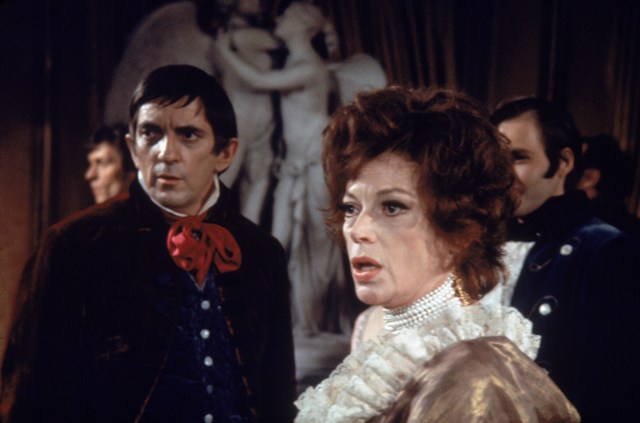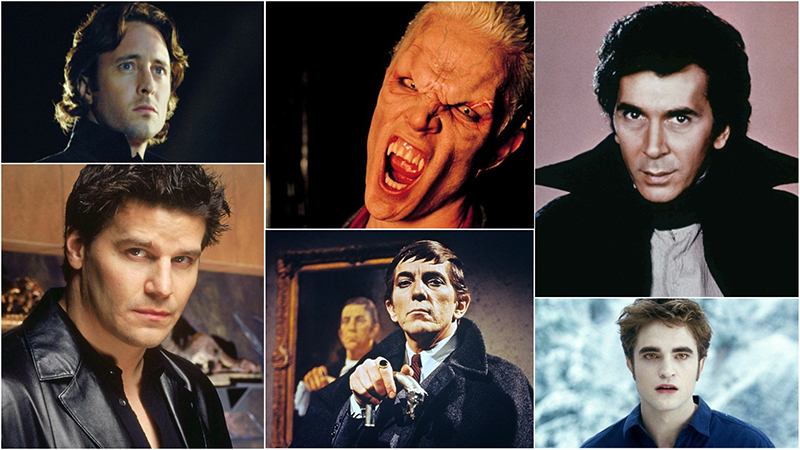Alex O’Loughlin as Mick St. John

Before he went Hawaiian (as in 5-0), Alex O’Loughlin had developed a cult following as private Investigator Mick St. John on the 2007 series Moonlight. Offers the official description, “In this eerie mystery series, Mick is charismatic, resourceful and undead. He has been a vampire since he was bitten by his bloodsucking bride, Coraline, 60 years ago. He struggles against his vampire nature, using his sharpened senses to help the living. Mick’s life — undeath, whatever — gets complicated when he falls for Beth Turner, a reporter haunted by dreams of a man who looks like Mick. Is there even a chance Beth would consider joining Mick’s world as his lover?”

Appeal of the Genre: “I’ve been kind of obsessed with the genre since I first discovered it, since I could first get my head around it. I discovered Anne Rice when I was sort of late teens. And I read the first five or six books of ‘The Vampire Chronicles.’ And I loved her character development, I learned so much about the mythology of vampires through her storytelling, some of which she sort of took dramatic license with, but a lot is authentic. In Australia, I grew up with American TV and American cinema, because we didn’t really have that much of our own. And so I grew up with all of the films that you guys did. Lost Boys was a huge film for me when that was made. And The Hunger was also something that I really loved. So, yeah, I have always sort of wanted to play a vampire.”

His Feelings About Mick: “I feel really sorry for Mick sometimes, because he can’t quite break out of the loneliness that he lives with and finds it hard to accept the life that he lives. That being said, it’s a pretty heavy duty life to accept. He has to live from human blood forever more, he will never die or get old. And the fact that he hates himself so desperately is something that makes me really feel for him. But I also enjoy his humor, his wry sensibilities and, though moralistic at times, his slightly amused outlook at the world. I also admire his vigilance in what he believes in.”

Feeling About the Show’s Cancellation After One Season: “It was wonderful to fight for something and keep it alive for longer than it otherwise would have been. It’s great to be a part of a success, even if it was for only a season. The thing is, we were able to tell some really important stories. It wasn’t just about these monstrous creatures and sexual romps. What we went for constantly is the big truth, for the human truth, the human story and that’s the reason we make films in the first place. We didn’t always hit it, but I feel that from time to time we did, and that’s why we held on to the audience, because they sensed that truth.”
Chris Sarandon as Jerry Dandridge

There were a lot of vampire films in the 1980s, but one of the best was 1985’s Fright Night. In it, a teen (William Ragsdale) discovers that his next door neighbor, Jerry Dandridge (Chris Sarandon), is a vampire, so he turns to local TV horror movie host Peter Vincent (Roddy McDowall) to help stop him. That’s it in a nutshell, but the film works as horror with a strong streak of humor. Chris Sarandon, born in West Virginia, portrayed the character, bringing equal doses of charm and terror.

Character Appeal: “The thing that appeals to me about Jerry is that he’s totally contemporary. That was something we all strived for, and something I found very interesting about the character, because he wasn’t the Count of legend or Bram Stoker, but a guy who everybody knew and couldn’t believe was being accused of being a vampire. He isn’t the personification of pure evil that vampires are known to be.

“Just think about this guy’s problems. On the one hand you’ve got somebody who’s got something everybody would probably love to have, which is eternal life. Also, he’s tremendously powerful physically, and attractive sexually. What he does, people are, for some reason, attracted to. But at the same time, how would you like to know that if people found out about you, nobody would really want to hang around you? That is, to have eternity, but to spend eternity shunned by any normal kind of society. Not being able to form any kind of normal human relationship. To be, in a way, damned to eternity. There’s a sense of this guy’s tragedy as well as his attractiveness.”

Why Fright Night: “I was sent the script by my agent and immediately sort of got sucked in by the plot, because it’s wonderfully constructed and plotted. After I read it, I said, ‘Gee, this is going to make a great movie. It’s a shame that I’m not really interested in playing this part.’ The reasons for that are that at the time I’d played a few villains and didn’t want to get locked into playing another one. I thought the character was an interesting one, though I didn’t think it was quite fleshed out. Despite my reservations, I had some conversations with [writer/director] Tom Holland, we came up with some ideas and I ended up doing it.”
Jonathan Frid as Barnabas Collins

Dark Shadows was a gothic horror soap opera that aired Monday through Friday from 1966-71 on ABC, with a total of 1,225 episodes. Although when the show began there was barely any supernatural elements to it, ratings were so anemic that producer Dan Curtis decided to go for broke and added a vampire into the mix. Canadian actor Jonathan Frid played the 175-year-old Barnabas Collins, who was inadvertently freed from his chained coffin (having been placed there by his father in the late 1790s) and began a reign of terror — until the audience responded with huge ratings and turned him into a genuine sensation, which resulted in his being transformed into the first sympathetic and reluctant vampire.

In 1970, he starred in the movie House of Dark Shadows, which retold the Barnabas storyline and, suffice to say, there wasn’t a bit of sympathy in him. Barnabas was a monster through and through.
His Approach: “I Love to play horror for horror’s sake. Inner horror. I never thought I created fear with the fang business of Barnabas. I always felt foolish doing that part of it. The horror part I liked was ‘the lie.’ There’s nothing more horrible than looking someone in the eyes who’s telling you a lie and you know it. Somehow that scares me more than anything else. Of course, I’ve ever been physically attacked by anybody with a knife or a gun… or teeth, and that may be quite horrible. But in terms of the theater, I liked the inner drama rather than the outward manifestation. An inner conflict or emotional confrontation is more of a drama to me. That’s why with Barnabas there were many scenes I was thrilled to do and why the show came alive so many times for me.

“It was Barnabas’ lie, that he was pretending to be something that he wasn’t, which motivated me. That pretense was something the actor playing Barnabas had to remember all the time. He got the lust for blood every once in a while, but always what preyed on his mind was the lie. And of course it played right into my lie as an actor. I was lying that I was calm and comfortable in the studio, just as Barnabas was lying that he was the calm, comfortable cousin from England. He wasn’t at all.”

The Appeal of Barnabas Collins: “Barnabas was a sympathetic vampire. He was a man with an addiction who drank blood only to survive. The audience felt pity for him, and many of the women wanted to mother him. Secondly, I’ve always felt that there was a love/hate relationship between the audience — particularly children — and Barnabas. In some ways he was looked upon as a darker version of Santa Claus; friendly enough that you were intrigued by him, yet mysterious enough that he frightened you.”
House of Dark Shadows: “I was not happy with it. I thought the script was merely a rehash of the early episodes and it got too realistic. The show was more Brigadoonish and charmingly naive. The movie had too much zipping, zapping, and too much silly violence for violence sake. I don’t know how many vampires ended up in that thing. I thought it was dull and lacked the charm of the soap opera.”

It Comes To a Close in April 1971: “The end wasn’t really a great shock, because the writing on the wall was always there for me. Every time the show went up another notch, I figured it was peaking and that it would start to go down. It lasted a hell of a lot longer than I thought it would. It wasn’t the average soap opera and they went through all the stories three or four times. We started repeating ourselves and the show burned out.”
CLICK HERE FOR FRANK LANGELLA AS DRACULA, BEN CROSS AS BARNABAS COLLINS AND JAMES MARSTERS AS SPIKE
